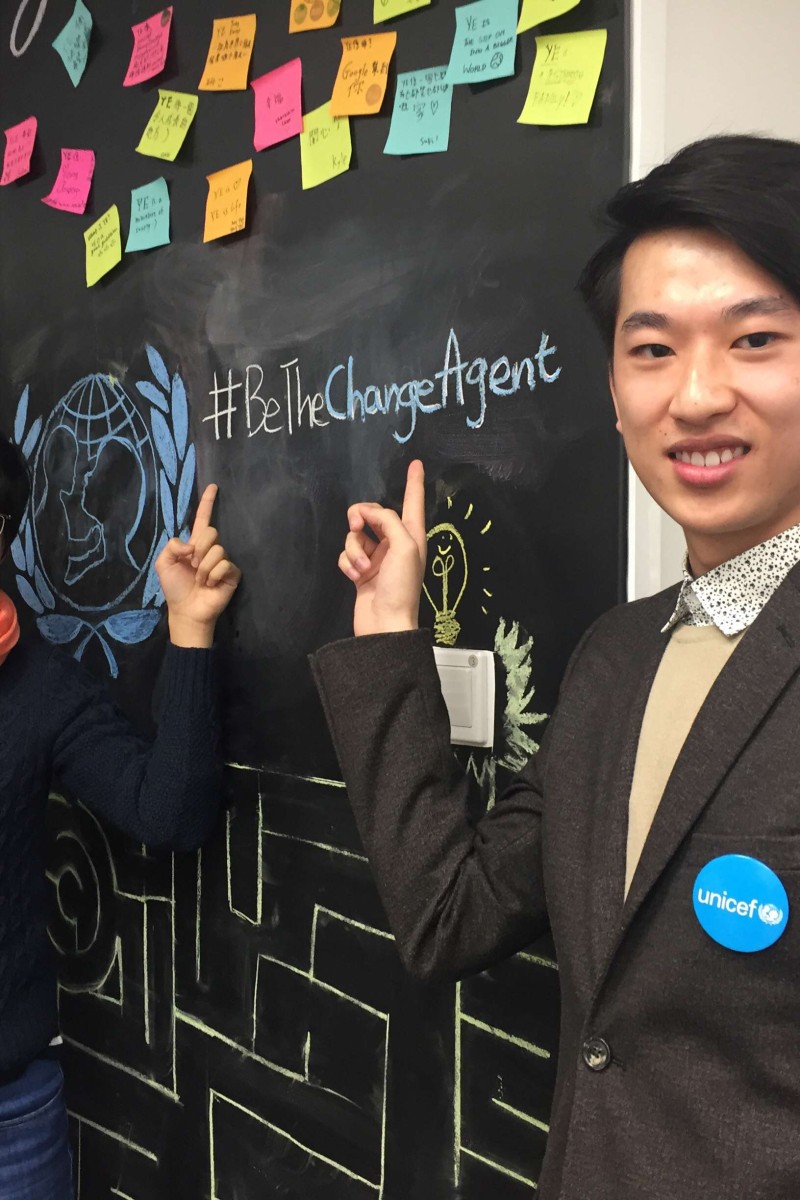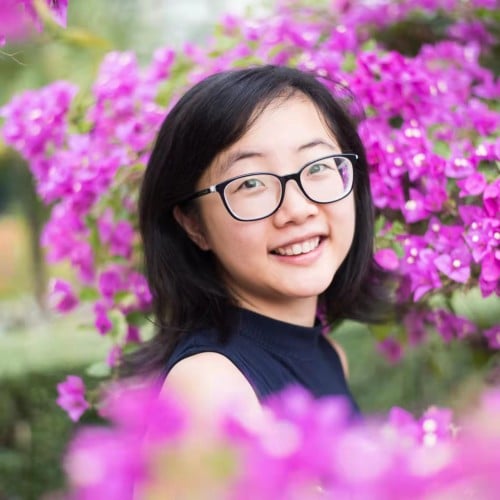
Children’s rights: what Unicef Hong Kong is doing to fight for them
From instilling in children the awareness of the rights they are entitled to, to giving them the knowledge that they can use in life to help the world, here’s what people who work with Unicef in Hong Kong are doing to fight for children’s rights
 Harrison Chung (right) never thought he would be a fully fledged children's rights advocate.
Harrison Chung (right) never thought he would be a fully fledged children's rights advocate. Harrison Chung joined Unicef Hong Kong’s Young Envoys Programme when he was in Form Three at Diocesan Boys’ School. Now, seven years later, he is helping the organisation to initiate a training workshop that will help teach the Young Envoys of today about children’s rights.
“I hadn’t planned [when I was 15] on being a children’s rights advocator, I was merely looking for an extracurricular activity,” says the law student at the University of Hong Kong. “All of my classmates were excelling in sports or music, and I was beginning to wonder where my own strengths lay.”
One thing led to another, and now Chung has spent one third of his life so far doing things with and for Unicef. From hosting youth radio initiative Voices of Youth to raise awareness of the rights of children, to appearing at the UN Youth Assembly as a representative of Unicef Hong Kong to discuss the education of people from ethnic minorities, Chung has gone from strength to strength in his attempts to see what he can truly do.
Now he wants to give back a little of the knowledge he has gained in his years to the Young Envoys Club and help people gain an in-depth understanding of children’s rights. Rights are, Chung says, a fairly new topic of discussion in Chinese society.
“I don’t expect the Young Envoys to [only] gain information and knowledge,” he says. That’s stuff you can easily get by looking it up online. “I want them to look at their own attitudes.
“A lot of times when you have to cite human rights, it’s because there has been a ‘human wrong’. For most teenagers in Hong Kong, these wrongs aren’t happening to them personally, it’s happening to someone else. [I want to encourage them to] start thinking about what they can give and what they can do to help,” says Chung. He’s also keen on impressing on younger students the importance of finding that balance between personal rights and duty to others. Titans Tam, a liberal studies teacher, agrees.
“When advocating children’s rights in areas like Hong Kong, [we have to teach people that] children need to be able to respect people other than themselves too.”
Chung and Tam are two of 3,000 children’s right advocates that Unicef Hong Kong has managed to nurture over the past three decades. Tam is a teacher at the Maryknoll Secondary School. Unlike Chung, she started her journey with Unicef Hong Kong a little later in life.
When Tam was in university, she signed up to be a school speaker. After she graduated and started teaching, Tam began asking herself if there wasn’t more that she could do to help her students.
“A lot of them have come from difficult or tricky family backgrounds, and some have special needs … but one thing they all have in common is that they don’t show much interest in the outside world,” says Tam, adding that students in Hong Kong seem to lack a world vision. “They think they can experience the whole world through their phones, because you can find anything with Google; but you just end up jumping from one piece of news to the next. There’s no time and no opportunity to digest information and to really understand it.”
That’s why she wanted Unicef Hong Kong to start a project at her school. Instead of inviting Unicef to just give a one-off talk though – “Many students [would just] fall asleep within the first 15 minutes [if they did that],” she says – Tam decided to try to incorporate children’s rights into her classes throughout the school year instead.
Although a discussion on the rights of children can be worked into many subjects, from Liberal Studies to Religion to Moral, Civic and National Education, Tam decided to add it into the Other Learning Experiences (OLE).
“Every [group of] students have a different way of learning,” says Tam on how flexible her programme is. “Schools can simply change or adapt the information to fit the class, [whether that’s with] video, drama or drawing.” After a year of testing the programme out on her Form Four class, Tam says the results have been startling – her students now have a much greater capacity for empathy for the world.
“They understand that war is really happening in certain places and that climate change can severely affect other children’s lives across the globe. They’ve been brought closer to these issues that used to be just news that they read about,” says Tam. She adds that the programme has also helped her students become more involved with things that happen in society around them, and has made them more likely to spread that message to their peers.
One of the things that her students did, for example, was design a game to simulate the effects of climate change. With your hands in a bucket of ice and water, you have to answer questions on a particular topic. Giving the right answers nets you a hot drink. “They wanted everyone to realise how precious a hot drink is when you face extreme coldness.”
Getting the programme off the ground wasn’t easy. Tam found that at her school, a lot of the teachers did not have much of an understanding of what children’s rights were. When she first brought up the idea of the programme, she was asked by one teacher if the students would not turn against them once the teachers taught them about their rights. That’s why the programme is important, says Tam. She wants teachers to be educated on the subject too. Tam was thrilled, therefore, to discover that the NGO is expanding her project to the Unicef HK School Partnership Scheme.
Sofia Fung, the advocacy manager of the Hong Kong Committee for UNICEF said that the scheme, based on Tam’s model, will be expanded to four schools later this year. The NGO will work with the teachers to figure out the best methods of teaching children’s rights for their individual schools.
“I never expected this programme to be expanded further than my school. I’m thrilled knowing that there are other teachers out there who want [their students to learn about children’s rights] and who realise how meaningful this project is.”
Unicef Hong Kong celebrates its 30th anniversary this year.
